Mitchell Ng quite milfy leh.Vacant BTO flats for sale: Outcry over MOP breaches reflects broader public housing woes

Michelle Ng
Housing Correspondent
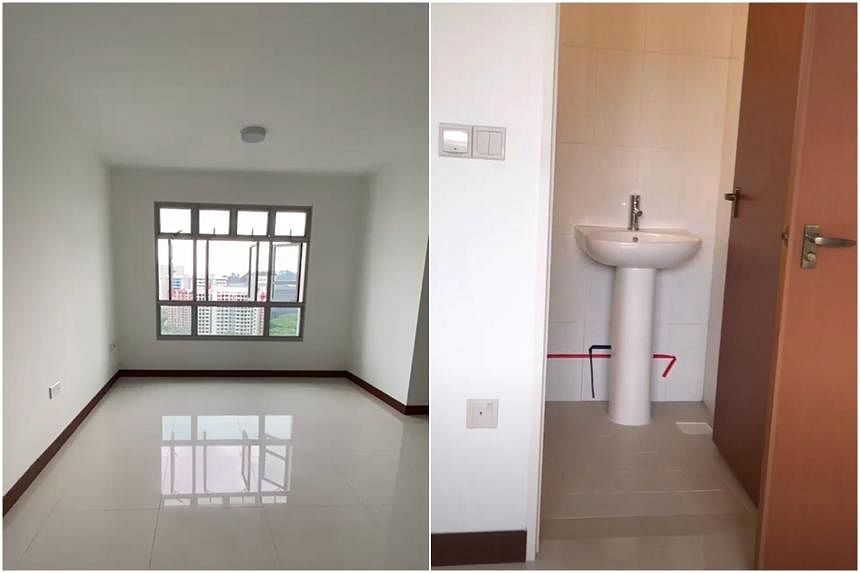
At least three unrenovated BTO flats that appear to have never been lived in before are up for sale on property listing portals. PHOTOS: SCREENGRABS FROM PROPERTYGURU
DEC 25, 2022
SINGAPORE – Recent media reports of seemingly vacant Build-To-Order (BTO) flats put up for sale on property portals have got some Singaporeans up in arms.
These flats are completely bare and unrenovated, with no apparent signs of having been lived in during the mandatory five-year minimum occupation period (MOP).
On Thursday, the Housing Board said 53 errant flat owners who did not live in their flats during the MOP had been taken to task in the last six years. This translates to less than nine each year, a minority given that there are more than one million HDB flats in Singapore.
But these MOP breaches have irked some Singaporeans, with online reaction ranging from anger towards the flat owners to disappointment in the inadequacy of public housing policies to stamp out such unlawful practices.
The public outcry reflects broader unhappiness over public housing issues and the difficulties that some Singaporeans face in getting their BTO flats.
In the past two years, application rates for BTO flats, which are launched for sale by the HDB four times a year and allocated via balloting, have risen sharply. This is partly driven by a cohort of millennials reaching marriageable age and seeking their first home, the growing trend of smaller households, and the attractive BTO projects in mature estates on offer.
Anecdotally, it is not uncommon to hear of Singaporeans who have failed many times in their BTO applications, some of whom eventually give up and turn to the HDB resale market where home prices are higher.
Thus, it understandably does not sit well with many to see a group of owners who are lucky enough to buy a BTO flat even though they do not need to live in them, and yet are hoping to sell them for a profit.
In other words, Singaporeans are fed up with people gaming the public housing system.
When it comes to detecting such “vacant” BTO flats, much relies on the public to raise any suspicious misuse of flats via a toll-free hotline, which will then prompt the HDB to investigate.
But how many people are willing to tattle on their neighbour?
While the HDB conducts around 500 inspections monthly to detect violations of housing rules, these are likely more of a deterrence and there may well be rule-breakers who go undetected.
This raises the question: Is there a more efficient way of detecting such cases instead of relying on public feedback, which may be unreliable and sporadic?
Netizens have raised the possibility of the HDB requesting monthly utilities bills, prior to the completion of any resale transaction, to see if HDB flats were occupied. But this may complicate paperwork and could run the risk of being too intrusive.
A more effective way could be to go after the property agents who may knowingly or unknowingly assist this group of owners in selling their flats.
Agents who come across these seemingly vacant flats should probe their sellers for further details, and report any suspicions to the HDB.
The board has said that every HDB flat sold on the open market is inspected as part of the selling process, and tell-tale signs of a home that has not been lived in will be investigated.
While owners who allow their flats to sit empty for years but have no intention of selling will likely not be detected, these cases should be in the minority, as the opportunity costs of tying one’s name to an unutilised HDB flat do not make much financial sense.
There may also be owners who choose to forgo an agent’s service, but navigating the resale process on their own will likely already pose some difficulties in selling.
In 2021, over 31,000 HDB flats were sold on the resale market.
The matter of “vacant” BTO flats on sale comes as the affordability of HDB resale flats and the pricing and availability of BTO flats have been in the spotlight in recent months.
In a recent interview with The Straits Times and Lianhe Zaobao, National Development Minister Desmond Lee said his ministry is looking into various aspects of public housing policies as part of the Forward Singapore exercise, and is prepared to consider major changes to meet the needs of the times – including possibly relooking the allocation of flats to prioritise first-time applicants with pressing housing needs.
It is an opportune time to address the issue of MOP breaches as part of the broad review, and consider whether they warrant more stringent enforcement action moving forward.
-
IP addresses are NOT logged in this forum so there's no point asking. Please note that this forum is full of homophobes, racists, lunatics, schizophrenics & absolute nut jobs with a smattering of geniuses, Chinese chauvinists, Moderate Muslims and last but not least a couple of "know-it-alls" constantly sprouting their dubious wisdom. If you believe that content generated by unsavory characters might cause you offense PLEASE LEAVE NOW! Sammyboy Admin and Staff are not responsible for your hurt feelings should you choose to read any of the content here. The OTHER forum is HERE so please stop asking.
You are using an out of date browser. It may not display this or other websites correctly.
You should upgrade or use an alternative browser.
You should upgrade or use an alternative browser.
The naivety of the PAP government
- Thread starter LITTLEREDDOT
- Start date
Man gets 19 weeks' jail over fraudulent Covid-19 grant claims for family members
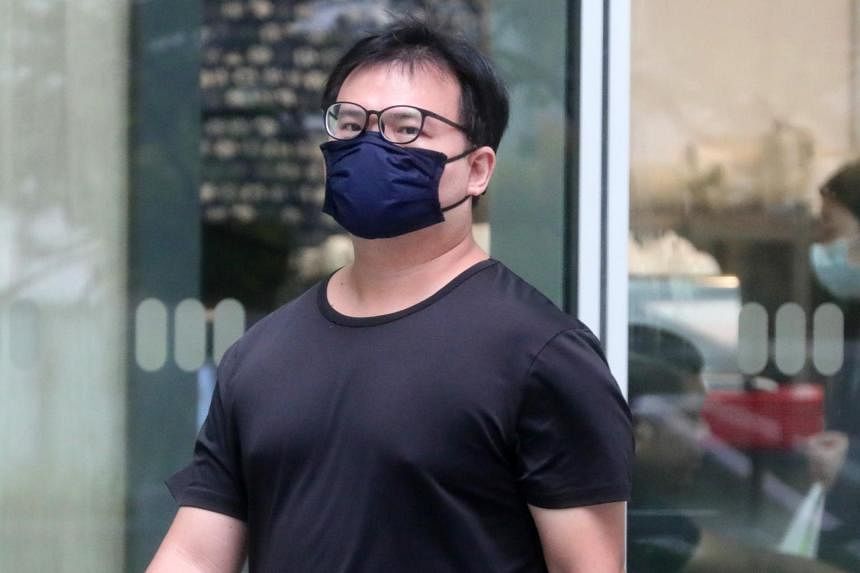
Huang Weiming duped the Ministry of Social and Family Developmen into disbursing a total of $4,800 from the Covid-19 Support Grant. ST PHOTO: KELVIN CHNG

Jessie Lim
OCT 12, 2022
SINGAPORE - A man lied about the employment status of his mother and wife to dupe the Ministry of Social and Family Development (MSF) into disbursing a total of $4,800 from the Covid-19 Support Grant to them.
He also falsely declared their last-drawn monthly income even though his wife voluntarily resigned from her job and his mother was a housewife.
On Wednesday, Huang Weiming, 38, was sentenced to 19 weeks' jail after he pleaded guilty to three charges of cheating and attempted cheating.
MSF lodged a police report on March 4, 2021 after it found out that Huang had submitted fraudulent applications.
The Covid-19 Support Grant is a financial support scheme rolled out to help Singapore residents cope with the economic and social impacts of the pandemic.
An applicant must have experienced, among other things, involuntary unemployment due to retrenchment or contract termination after Jan 23, 2020.
The court heard that in July 2020, Huang applied for the grant on behalf of his mother, Madam Chai Chorng Yin, 68, claiming she was employed by his company, Reastar.
He is the owner and sole proprietor of Reastar, which provides accounting services.
In the application, Huang lied that Madam Chai's last-drawn monthly salary was $1,000. However, she was a housewife who had never been employed.
Deputy Public Prosecutor Cheng You Duen noted that Huang knew that Madam Chai did not meet the eligibility criteria, as she had not been retrenched nor had she lost her personal income due to Covid-19.
In September 2020, Huang helped his wife, Madam Wang Qing, 35, to apply for the grant.
He declared that she lost her job due to Covid-19 although she had resigned from her company, Tropic Planners and Landscape, over personal reasons.
As the application required him to include a contact from the human resources department of Madam Wang's former company, he provided a fake name and listed his phone number.
Deceived by Huang that Madam Wang and Madam Chai were eligible for the grant, MSF disbursed $2,400 to each of them.
Huang also submitted a fraudulent application on behalf of his father, Mr Ng Ah Soi, 71.
Despite knowing that his father was terminated by his company, Joseph Coach Services, for misconduct, Huang wrote in the application that his father would lose at least 30 per cent of his salary due to Covid-19.
MSF rejected the application after assessing that Mr Ng did not suffer such a loss, based on the information provided.
Last December, a woman attempted to claim money from the Covid-19 Support Grant by forging a termination letter from the condominium she worked at as an administrative assistant. She was sentenced to 16 months' jail for attempted cheating and other offences.
The offence of cheating carries a jail term of up to 10 years and a fine.
Jail for trio linked to ruses to get Covid-19 grants

(From left) Joey Yeo and Danny Ho Wai Hong were each sentenced to two months and a week’s jail. Loo Yi Ming was sentenced to a month’s jail. ST PHOTOS: KELVIN CHNG

Shaffiq Alkhatib
Court Correspondent
DEC 2, 2022
SINGAPORE – Two former spa employees, who falsely claimed that their jobs there had been affected after the Covid-19 pandemic struck, were each sentenced to two months and a week’s jail on Friday.
Joey Yeo, 29, and Danny Ho Wai Hong, 31, each received $500 from a government grant.
Ho worked at Kings Spa, while Yeo worked for the firm when it was known as Spa 9.
The pair pleaded guilty in November to a charge each of cheating and furnishing false information to a public servant.
A third person, Loo Yi Ming, 31, who signed off on fraudulent documents to help the spa obtain another grant, was sentenced to a month’s jail on Friday. He pleaded guilty to a charge of falsification of accounts.
Deidrea Tan Zhong Lin, 31, who was the spa’s director at the time of the offences, was earlier sentenced to seven weeks’ jail over her role in the offences.
The case against her husband Gay Kah Leong, 31, then the spa’s operations manager, is pending.
Deputy Public Prosecutor Tay Jia En said in earlier proceedings that in 2018 or 2019, Yeo came to an agreement with the spa’s management that she would continue as a “phantom employee” after she indicated her wish to stop working.
This meant the spa would continue to make Central Provident Fund (CPF) contributions to her.
A similar arrangement was made between Ho and Gay in August 2018.
Ho, who began working for the spa as a receptionist on July 1, 2018, stopped working there the following month.
But according to court documents, Gay told him that the spa would make CPF contributions to him as a “phantom employee” so that it could continue to hire foreign workers.
From June 2019 to August 2020, Yeo and Ho received monthly CPF contributions from the spa despite not working there, with Yeo receiving at least $7,326 and Ho getting no less than $5,809.
In order to maintain the facade that they were genuine employees, they also signed off on falsified payslips.
In her application for the Temporary Relief Fund, Yeo falsely declared that she had lost her job due to Covid-19 and that her gross monthly income before Jan 23, 2020, was $1,000.
She later admitted that this amount was based on the CPF contributions she was receiving from the spa as a phantom employee. Meanwhile, Ho lied in his application that he lost at least 30 per cent of his income.
He claimed that his gross monthly income before Jan 23, 2020, was $1,500 – which included $1,300 in salary from Kings Spa – and that it had fallen to $800.
DPP Tay had said: “Danny admitted that he had to ‘anyhow put in’ this amount so that it would show that he had lost at least 30 per cent of his personal income.”
Meanwhile, in order to obtain a payout under the Jobs Support Scheme (JSS), which was aimed at providing wage support to employers and helping enterprises retain their local staff, Gay is said to have intentionally submitted fraudulent documents on Aug 10, 2020, to the Inland Revenue Authority of Singapore (Iras) for a self-review.
To prevent and detect abuse of the scheme, Iras implemented a framework for the JSS in June 2020 that identified employers with a higher risk profile.
They were then asked to conduct a self-review by making a declaration and provide supporting documents to substantiate their eligibility.
Loo, who was working as an account manager at another firm, signed off on the falsified documents. Iras reviewed the application but did not disburse the payout to Kings Spa.
Also as part of the self-review, Iras officers contacted Ho and Yeo about their employment statuses. They lied and said they did not illegally receive CPF contributions and that they were employed by the spa at that point in time.
An Iras officer alerted the police on Sept 28, 2020.
Yeo decided to start serving her sentence on Friday.
Loo and Ho were each offered bail of $5,000. Ho will start serving his sentence on Dec 5, while Loo will do so four days later.
Jail for mastermind who cheated govt agencies amid Covid-19 pandemic


Shaffiq Alkhatib
Court Correspondent
FEB 24, 2023
SINGAPORE - A spa operations manager masterminded a scheme and defrauded government-launched financial support initiatives aimed at helping parties affected by the Covid-19 pandemic.
Between July and August 2020, Gay Kah Leong, who was then working for Kings Spa, submitted to the Inland Revenue Authority of Singapore (Iras) items such as false declarations in an attempt to cheat it into disbursing Jobs Support Scheme (JSS) payouts totalling $50,326.
The police said on Thursday that inconsistencies were later detected, and the monies were not disbursed.
In a separate incident in April 2020, he also cheated the Ministry of Social and Family Development (MSF) into disbursing a Temporary Relief Fund (TRF) application for himself. MSF was then duped into disbursing a $500 one-time cash grant to him.
Gay, 31, who has since made full restitution, was sentenced to 13 months’ jail on Thursday after he pleaded guilty to two counts of attempted cheating and one count of cheating.
Multiple people, including former Kings Spa employees, were earlier given jail sentences over their roles in similar offences. Among them was Gay’s wife, Deidrea Tan Zhong Lin, who was the spa’s director at the time. Tan, then 31, was sentenced to seven weeks’ jail in July 2022.
Deputy Public Prosecutor Tay Jia En said that JSS was a grant scheme aimed at providing wage support to employers and helping enterprises retain their local employees.
Under the initiative, the Government co-funded between 25 per cent and 75 per cent of the first $4,600 of gross monthly wages paid to each local employee through cash subsidies.
Employers did not have to apply for the scheme, as the cash grants were automatically computed based on mandatory Central Provident Fund contribution data.
TRF was aimed at providing support to Singapore citizens and permanent residents who became jobless or lost a substantial portion of their income due to the pandemic.
Individuals had to submit supporting documents such as their retrenchment letters with their applications.
On April 7, 2020, Gay submitted two TRF applications online for himself. In the applications, he falsely declared that he had lost at least 30 per cent of his personal income.
He also provided falsified payslips and salary adjustment letters bearing Kings Spa’s letterhead. MSF later approved one of the applications and disbursed $500 to him.
Gay later tried but failed to cheat Iras of $50,326. He had submitted false declarations and employment documents to the agency to try and dupe it into disbursing JSS payouts involving 36 individuals.
Among other things, some of these people were falsely declared as having worked for Kings Spa.
The false declarations and bogus employment documents were submitted to Iras as part of a JSS self-review that Kings Spa was selected to perform.
In September 2020, Iras lodged a police report, stating the spa had provided false information as part of the self-review.
On Thursday, defence lawyer Kalidass Murugaiyan told the court that Gay had learnt a valuable lesson and was remorseful.
His bail was set at $15,000, and he is expected to surrender himself at the State Courts on March 10 to begin serving his sentence.
Company director gets 12 weeks’ jail after duping trade union into handing over nearly $14k


Shaffiq Alkhatib
Court Correspondent
Mar 8, 2023
SINGAPORE - The sole director of a consultancy firm worked together with its general manager to dupe trade union Singapore National Employers Federation (SNEF) into delivering nearly $14,000 in Professional Conversion Programme (PCP) grants.
Malaysian Lim De Xian, 33, from 7W Consultancy, was sentenced to 12 weeks’ jail on Wednesday after he pleaded guilty to two counts of cheating. Two charges for falsification of accounts were considered during sentencing.
Lim and Singaporean Xu Shaowen, 33, conspired to cheat SNEF into disbursing grants by having Xu falsely declare an inflated salary in his PCP application sometime around Dec 1, 2017. This was to maximise the amount of grants 7W Consultancy could obtain.
PCP aims to help mid-career professionals, managers, executives and technicians, who are Singaporeans or permanent residents, to undergo skills conversion to move into new jobs. Participating firms would then receive salary support and course fee funding.
The initiative was funded by Workforce Singapore (WSG) and administered by SNEF.
Lim and Xu agreed that the latter would declare a monthly salary of $5,800 in his PCP application, when in fact he earned around $1,250. Xu later submitted the PCP application form and supporting documents to SNEF via email.
SNEF was then duped into disbursing nearly $14,000 in total.
On May 20, 2020, a WSG officer alerted the police that 7W Consultancy had made false declarations in a PCP application.
Xu and Lim were subsequently charged in court in May 2022.
On Wednesday, Lim’s defence lawyer, Mr S. S. Dhillon pleaded for leniency and said that Lim is remorseful.
The lawyer for Dhillon & Panoo law firm added: “He... will not run foul of the law again. Lim will also treasure any second chances given to him.”
Xu was sentenced to 13 weeks’ jail in November 2022, after he pleaded guilty to one count each of cheating and falsification of accounts.
7W Consultancy has since made a full restitution of $13,995 to WSG.
Separately, Lim and Xu also worked together to try dupe SNEF of items, including a salary grant of $11,760 to 7W Consultancy. However, this PCP application was withdrawn before SNEF disbursed any grants.
According to court documents, the two men and their then-colleague Chinese national Chen Xianyi, 32, entered into a conspiracy to cheat SNEF around April 11, 2018.
The DPP said that Mr Chen’s monthly salary was falsely inflated to $5,600 in his PCP application. His actual salary was not disclosed in court documents. Mr Chen later asked Xu to withdraw the application.
Mr Dhillon told The Straits Times that Mr Chen has not been charged in court.
Forum: Exempted Massage Establishment rules need tightening
Apr 3, 2023We regularly read in the news about anti-vice police raids on shops that offer massage services.
Under the different types of massage establishments regulated by the police is one category known as the exempted massage establishment. Such establishments do not require their owners to register their employees with the police.
These establishments do not need to pay an annual licence fee and do not need Case Trust Accreditation.
There is also no requirement for a two-year lease or 100 sq m floor area, and no requirement for a capital investment of $50,000 in renovation, assets or rental.
Employees also need not wear a company uniform.
These exempted massage establishments are meant to provide their services in full view of the public. However, these shops often put up curtains or even erect wooden partitions to block the view from the outside.
The lax requirements and the low cost of operations for these exempted massage establishments encourage owners to adopt illicit practices.
If operators’ shops are closed down due to breaches in licensing requirements, it’s easy for them to open new ones because of the low start-up cost.
If necessary, they use another person’s identification details to register as the owner. This person gets paid but has no business involvement at all.
There is a need for the Government to tighten the requirements for exempted massage establishments.
In addition, there is also a need to have stricter legislative requirements for and enforcement action against beauty salons that operate without a massage licence but use the establishments as a front to offer illicit massage services.
The professional image of many proper massage establishments that follow the law to make an honest living should not be tarnished by unscrupulous operators.
Wong Hen Jeng
Forum: Exempted Massage Establishment rules need tightening
Apr 3, 2023
We regularly read in the news about anti-vice police raids on shops that offer massage services.
Under the different types of massage establishments regulated by the police is one category known as the exempted massage establishment. Such establishments do not require their owners to register their employees with the police.
These establishments do not need to pay an annual licence fee and do not need Case Trust Accreditation.
There is also no requirement for a two-year lease or 100 sq m floor area, and no requirement for a capital investment of $50,000 in renovation, assets or rental.
Employees also need not wear a company uniform.
These exempted massage establishments are meant to provide their services in full view of the public. However, these shops often put up curtains or even erect wooden partitions to block the view from the outside.
The lax requirements and the low cost of operations for these exempted massage establishments encourage owners to adopt illicit practices.
If operators’ shops are closed down due to breaches in licensing requirements, it’s easy for them to open new ones because of the low start-up cost.
If necessary, they use another person’s identification details to register as the owner. This person gets paid but has no business involvement at all.
There is a need for the Government to tighten the requirements for exempted massage establishments.
In addition, there is also a need to have stricter legislative requirements for and enforcement action against beauty salons that operate without a massage licence but use the establishments as a front to offer illicit massage services.
The professional image of many proper massage establishments that follow the law to make an honest living should not be tarnished by unscrupulous operators.
Wong Hen Jeng
Just legalize and regulate prostitution, follow Germany's system, retrench the 'anti-vice' jiakliaobees, and maybe keep a watch over secret societies or racketeering in the industry. That's it, problem solved.
Jail for ex-executive of casino regulator who took $93k of printer cartridges from agency, sold them


Shaffiq Alkhatib
Court Correspondent
Apr 3, 2023
SINGAPORE - A Casino Regulatory Authority (CRA) senior executive misappropriated more than 750 printer cartridges worth over $93,000 from the agency and sold them online.
Zulkiflie Yacob, 45, who in no longer working there, was sentenced to two years and a month’s jail after he pleaded guilty on Monday to two counts of criminal breach of trust involving 621 cartridges worth nearly $80,000.
A third charge involving the remaining 132 cartridges worth more than $13,000 was considered during sentencing.
Deputy Public Prosecutor Niranjan Ranjakunalan said that CRA was a statutory board under the Ministry of Home Affairs. It is now known as the Gambling Regulatory Authority.
As a CRA employee, Zulkiflie’s job scope included procuring office supplies and purchasing printer cartridges.
To commit his offences, he deliberately over-ordered cartridges between April 1, 2016 and Oct 30, 2018.
The DPP said: “The accused did so with the intention of dishonestly misappropriating and selling some of these printer cartridges, and pocketing the sales proceeds.”
Zulkiflie justified these purchases of printer cartridges in the quarterly approval-of-purchase put up by him on the basis that they were in accordance with factors such as the utilisation of printer cartridges in previous quarters.
After that, he sold them on online market marketplace Carousell.
CRA lodged a police report after discovering discrepancies between the number of cartridges purchased and the number of those used, as well as how many such items were left in stock.
Zulkiflie was arrested on March 12, 2020, and was released on bail soon after.
“During the course of investigations, the accused revealed that he declared financial embarrassment in 2015 and therefore used the monies received from the sale of the dishonestly misappropriated printer cartridges to pay his bills and expenses,” said the prosecutor.
On Jan 15, 2023, Zulkiflie made partial restitution of $25,000 to the Gambling Regulatory Authority.
Defence lawyer Azri Imran Tan from IRB Law said that his client has completely handed over all benefits he received from the offences.
Pleading for a sentence of not more than 16 months’ jail, Mr Tan added: “Zul wishes to explain that the restitution amount made is based on the amount of money he earned from selling the misappropriated toners and cartridges.”
Mr Tan said that, according to his client, the toners and cartridges were sold at a markdown from their original purchase prices, at around $50 to $100 individually.
Zulkiflie’s bail was set at $15,000 on Monday, and he is expected to surrender himself at the State Courts on April 28 to begin his jail term.
For each count of criminal breach of trust, an offender can be jailed for up to 20 years and fined.
Forum: Step up security to prevent theft of donated food items
Apr 6, 2023I donate food items to The Food Bank Singapore and drop them off at different collection points.
On Monday, I saw a man rummaging through the collection bins at Compass One in Sengkang and taking items away. He even tore apart some packaging to take specific items he wanted.
It is disturbing to see that donated items might not be going to the intended recipients, and could also be damaged.
I now hesitate to drop off food items at this Food Bank collection point, which is situated on Level 1 in a quiet corner away from passers-by.
Food Bank and other organisations that have similar initiatives should improve the security of their collection points to prevent theft or damage to donated goods.
For example, the bins could be placed next to the mall’s customer service counter, where staff could more easily deter people from taking the donated items.
Alex Yeo
Can not consider donate to the scav? May be is needy too?Forum: Step up security to prevent theft of donated food items
Apr 6, 2023
I donate food items to The Food Bank Singapore and drop them off at different collection points.
On Monday, I saw a man rummaging through the collection bins at Compass One in Sengkang and taking items away. He even tore apart some packaging to take specific items he wanted.
It is disturbing to see that donated items might not be going to the intended recipients, and could also be damaged.
I now hesitate to drop off food items at this Food Bank collection point, which is situated on Level 1 in a quiet corner away from passers-by.
Food Bank and other organisations that have similar initiatives should improve the security of their collection points to prevent theft or damage to donated goods.
For example, the bins could be placed next to the mall’s customer service counter, where staff could more easily deter people from taking the donated items.
Alex Yeo

Man jailed 37 months for masterminding fake tax refunds, evading GST
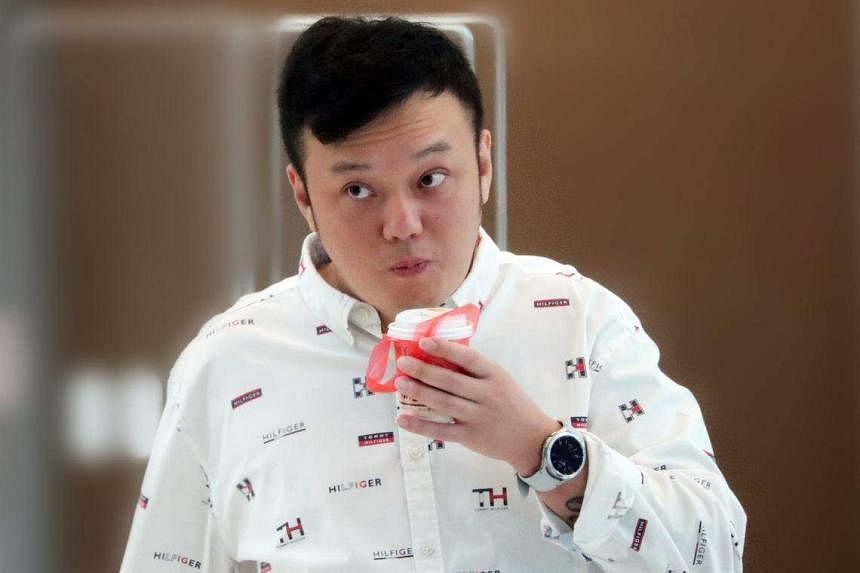
Alan Yeo was jailed for 37 months and handed a $6,000 fine. ST PHOTO: KELVIN CHNG

Aqil Hamzah
Apr 14, 2023
SINGAPORE – Schemes to claim tax refunds on fake purchases and evade GST in Singapore have landed its mastermind a 37-month jail sentence.
In late 2020, Alan Yeo, 34, recruited two men to travel to London, where they were told to make fraudulent value-added tax (VAT) refunds. Using fictitious invoices for jewellery they had not bought, the duo ended up receiving €42,975 (S$63,000) in refunds, with Yeo taking a cut.
Yeo convinced one of them to avoid declaring the cash amount of the VAT refund that was brought into Singapore, despite the amount being more than $20,000.
He also instructed the other man to bring jewellery from overseas into Singapore and to not declare it to avoid paying the requisite goods and services tax (GST).
On Friday, Yeo was jailed for 37 months and handed a $6,000 fine, said the Singapore Police Force and Singapore Customs in a joint statement.
Investigations began after Singapore Customs received information of “an unsuccessful attempt to make VAT refund claims in a European country”.
“Claiming tax refunds from overseas authorities through fraudulent means can amount to a foreign serious offence or foreign serious tax offence,” said the statement.
It added that Singapore has zero-tolerance towards money laundering, regardless of whether the proceeds were obtained here or abroad.
The police stressed the need for travellers to declare the physical movement of any cash or bearer negotiable instrument exceeding $20,000, or its equivalent in a foreign currency, in or out of Singapore.
Jail for man who cheated BCA to get higher grading for firm so it could bid for bigger projects

Shaffiq Alkhatib
Court Correspondent
May 22, 2023
SINGAPORE – A freelance consultant created false documents that an accomplice submitted to a government agency in a bid to obtain a higher financial grading for their firm so that it could bid for higher value projects.
According to court documents, Mohamed Barak Lathif, 50, worked with Felicia Low Mun Xin, 34, and Joseph Ang Kok Leng, 52, to cheat the Building and Construction Authority (BCA) in 2020.
Barak was sentenced to four weeks’ jail on Monday after he pleaded guilty to a cheating charge.
Low was also sentenced to four weeks’ jail in March, while Ang’s case is still pending.
In 2016, Ang set up a firm called Lin Interior Design Works, which was renamed LIN ID Group in 2021. He set up another firm called LIN Builders in 2017, and it was mainly involved in construction-related projects.
The prosecution told the court that LIN Builders was formed to complement LIN ID.
Low was a director and shareholder at LIN Builders, as well as the chief accountant for both LIN ID and LIN Builders.
Barak was a freelance consultant from around 2017 for both firms, which he helped on risk assessment and work safety matters, receiving a monthly remuneration of $500.
LIN Builders was registered with a C3 grading in the Contractors Registration System, which the BCA administers for the procurement of construction and construction-related services for the public sector.
In 2019, Low submitted to the BCA an application for LIN Builders to have a C1 financial grading, which would allow LIN Builders to bid for projects and tenders of a higher value.
Deputy Public Prosecutors R. Arvindren and Goh Qi Shuen stated in court documents: “Specifically, at the material time, a C1 financial grading would have allowed LIN Builders to tender for public sector projects with project values of up to $4 million.
“The C1 financial grading would also allow LIN Builders to advertise themselves as being accredited as such by BCA. This would allow LIN Builders to attract more clients and improve the company’s reputation.”
This application was later rejected as LIN Builders did not satisfy one of the prerequisites for the C1 financial grading, namely that the total value of the projects it had worked on in the previous three years should be at least $3 million.
Court documents did not disclose the criteria for a C3 grading at that time.
In 2020, Ang approached Barak and said he wanted LIN Builders to be given the C1 financial grading as he wanted to take part in upcoming tenders, the prosecution said.
Barak replied that he would prepare documents to submit to BCA to create the impression that LIN Builders satisfied the $3 million criterion, and pass them to Low.
The DPPs told the court that Barak knew it was wrong to prepare these false documents for submission to BCA.
Despite this, he prepared false documents pertaining to fictitious projects where LIN Builders was purportedly a subcontractor for two other firms, indicating that LIN Builders was involved in jobs worth more than $3 million for the two firms.
Among other things, Barak prepared a fictitious track record declaration stating that LIN Builders had completed a $2.9 million contract with one of the firms over the building of a multi-storey sub-station between May 2019 and April 2020.
This declaration was supported by a fake subcontractor contract between LIN Builders and the firm.
Low later submitted the false documents Barak prepared to apply to BCA for a C1 financial grading for LIN Builders.
The DPP said that BCA approved LIN Builders’ application for a C1 financial grading in August 2020.
Court documents did not disclose how the offence came to light, but Barak was later charged in court in 2022.
His bail was set at $10,000 on Monday and he is expected to surrender himself at the State Courts on June 9 to begin serving his sentence.
For cheating, an offender can be jailed for up to three years and fined.
Ai ya. These people are the jiu Hu kia.Jail for man who cheated BCA to get higher grading for firm so it could bid for bigger projects

Shaffiq Alkhatib
Court Correspondent
May 22, 2023
SINGAPORE – A freelance consultant created false documents that an accomplice submitted to a government agency in a bid to obtain a higher financial grading for their firm so that it could bid for higher value projects.
According to court documents, Mohamed Barak Lathif, 50, worked with Felicia Low Mun Xin, 34, and Joseph Ang Kok Leng, 52, to cheat the Building and Construction Authority (BCA) in 2020.
Barak was sentenced to four weeks’ jail on Monday after he pleaded guilty to a cheating charge.
Low was also sentenced to four weeks’ jail in March, while Ang’s case is still pending.
In 2016, Ang set up a firm called Lin Interior Design Works, which was renamed LIN ID Group in 2021. He set up another firm called LIN Builders in 2017, and it was mainly involved in construction-related projects.
The prosecution told the court that LIN Builders was formed to complement LIN ID.
Low was a director and shareholder at LIN Builders, as well as the chief accountant for both LIN ID and LIN Builders.
Barak was a freelance consultant from around 2017 for both firms, which he helped on risk assessment and work safety matters, receiving a monthly remuneration of $500.
LIN Builders was registered with a C3 grading in the Contractors Registration System, which the BCA administers for the procurement of construction and construction-related services for the public sector.
In 2019, Low submitted to the BCA an application for LIN Builders to have a C1 financial grading, which would allow LIN Builders to bid for projects and tenders of a higher value.
Deputy Public Prosecutors R. Arvindren and Goh Qi Shuen stated in court documents: “Specifically, at the material time, a C1 financial grading would have allowed LIN Builders to tender for public sector projects with project values of up to $4 million.
“The C1 financial grading would also allow LIN Builders to advertise themselves as being accredited as such by BCA. This would allow LIN Builders to attract more clients and improve the company’s reputation.”
This application was later rejected as LIN Builders did not satisfy one of the prerequisites for the C1 financial grading, namely that the total value of the projects it had worked on in the previous three years should be at least $3 million.
Court documents did not disclose the criteria for a C3 grading at that time.
In 2020, Ang approached Barak and said he wanted LIN Builders to be given the C1 financial grading as he wanted to take part in upcoming tenders, the prosecution said.
Barak replied that he would prepare documents to submit to BCA to create the impression that LIN Builders satisfied the $3 million criterion, and pass them to Low.
The DPPs told the court that Barak knew it was wrong to prepare these false documents for submission to BCA.
Despite this, he prepared false documents pertaining to fictitious projects where LIN Builders was purportedly a subcontractor for two other firms, indicating that LIN Builders was involved in jobs worth more than $3 million for the two firms.
Among other things, Barak prepared a fictitious track record declaration stating that LIN Builders had completed a $2.9 million contract with one of the firms over the building of a multi-storey sub-station between May 2019 and April 2020.
This declaration was supported by a fake subcontractor contract between LIN Builders and the firm.
Low later submitted the false documents Barak prepared to apply to BCA for a C1 financial grading for LIN Builders.
The DPP said that BCA approved LIN Builders’ application for a C1 financial grading in August 2020.
Court documents did not disclose how the offence came to light, but Barak was later charged in court in 2022.
His bail was set at $10,000 on Monday and he is expected to surrender himself at the State Courts on June 9 to begin serving his sentence.
For cheating, an offender can be jailed for up to three years and fined.
Whistleblower calls out alleged unfair hiring practices in Singapore banking industry
ByTerry Xu
-
May 19, 2023
167

An anonymous whistleblower, working in the banking sector, has voiced serious concerns over senior staff appointments within Citibank’s Singapore branch from India, suggesting that the bank may be overlooking potentially viable local candidates.
The whistleblower, who chose to stay anonymous due to job security concerns in her present local bank, detailed alleged instances of favoritism at Citibank. She drew inspiration from a GRAB delivery rider who openly challenged the issue of foreigners displacing Singaporeans in the job market. Despite disagreeing with his approach, she commended his determination in confronting such biases.
According to her source, the Global Functions head, operating from Citibank’s Changi Business Park, had recruited two Senior Vice Presidents (SVPs) from India. She noted that these SVPs continued to recruit more India-based staff, to work in India for the Global Functions Head in Singapore.
“This cronyism needs to stop. Singaporeans need to start reporting on these abuses of power,” the whistleblower stressed.
Her contact’s concern heightened when one of the Indian SVPs, having served Citibank India for two years and 11 months – of which eight months was as SVP, was transferred to Singapore in February 2023, which incurred significantly higher costs than their original salary in India.
The bank, however, did not advertise the position or interview any local candidates, which seemed contradictory – to the whistleblower – to the Tripartite Alliance for Fair and Progressive Employment Practices (TAFEP)’s recommendations.
She highlighted, “The salary of a typical SVP in Singapore is around 20,000 SGD p/mth. This transfer is blatant cronyism in its simplest form.”
However, under current regulations, a company does not have to advertise the position if it is an intra-company transfer from overseas. Such transfers also do not affect the company’s quota for foreign staff.
It should also be noted that the fixed monthly salary of the job position is more than S$20,000, it too will be exempted from the requirement to advertise job vacancies on the Singapore jobs search portal MyCareersFuture.sg.
Despite her attempts to escalate these issues through Citibank’s Ethics website, she was disappointed by the lack of substantial response. Her concerns over anonymity were also heightened as she was directed to reach out to a specific Citibank representative for more details.
“All of the CEOs in the companies pretend to have a sizeable local demographic of permanent staff when there is also a sizeable foreign demographic of contract staff. I have been in both banking and non-banking companies and heard many stories from friends in especially the banking sector,” said the whistleblower.
“Changi Business Park is the worst case because about 3/4 of the employees there are not local. In all celebratory functions, the locals are the minority and it is very visible. For contract staff, who are majority not local, their employment agencies are all from India. Tata Consultancy Services, Virtusa, Larsen and Toubro, Nityo Infotech, HCL, etc.”
“You can see how easy it is for an Indian to come to Singapore and get a job through a contract role and work their way up to a permanent position. If Singaporeans just take an MRT to Expo MRT station in the morning on weekdays and just have a coffee near the bus stop there, your eyes will be opened wide. It is like you are in a different country”
She noted that the influx of foreign talents began in the early 2000s, and two decades later, one would expect that locals, after gaining the requisite skills and experience, would occupy top IT positions and manage these foreign professionals. However, contrary to expectations, it’s the foreign talents who continue to dominate top management positions, overseeing both their foreign peers and local staff.
The whistleblower expressed her deep-rooted concerns about the current situation and the future of the banking sector in Singapore, saying, “If this is the future of Singapore, I’m just biding my time to migrate to another country that values me. Being a PR in this country is sufficient enough to enjoy the fruits of labour of the country’s prosperity and success”
When asked about the possibility of Singaporeans not being able to fill up the position and therefore requiring the intra-transfer, the whistleblower said she does not believe that Singaporeans cannot do the job that the SVP can do.
The whistleblower provided several reasons to support her allegations:
- Firstly, she pointed out that the new Senior Vice President graduated from a university in a third-world country – her Masters degree also from an unrenowned institution. She suggested that it’s implausible that a Singaporean graduate from a top-rated local university couldn’t perform her job for a S$20,000 salary. Particularly considering that the role is a typical project manager position. For perspective, the SVP’s university ranks #521-530 in the QS World University Rankings 2023, whereas the National University of Singapore (NUS) and Nanyang Technological University (NTU) occupy the 11th and 19th spots, respectively.
- The whistleblower questioned the true intentions behind her transfer to Singapore. She was able to manage her work remotely from India during the pandemic, however, transferring to Singapore effectively doubled her salary and burdening projects with unnecessary costs when that funding could have been allocated to local support for the projects. Instead, corporate transfers occur seemingly without hindrance, driving up costs such as housing rental and living expenses. These individuals can maintain their cost of living comfortably with a S$20k salary. If she sets a precedent for this department, she warns, it will inevitably lead to similar transfers from the rest of the Indian team under this new Global Functions Head.
- Lastly, she voiced concerns about Singaporeans not being given the opportunity to showcase their capabilities as job positions are not being advertised. The whistleblower shared personal experiences of applying for jobs in banks like Citi, DBS, Standard Chartered only to be told that most of the positions are already filled. She claimed that these banks simply post the positions online on platforms like LinkedIn and MyCareersFuture.sg to comply with regulations, but in her view, this is simply a façade in Singapore’s context. To add to the insult, she claimed, local human resource executives are unwittingly participating in this show. They source local candidates, prompt them to apply for the positions, conduct interviews, only to waste the candidates’ time because the hiring managers have already selected their foreign candidates.
Looking back, then-Deputy Prime Minister and Chairman of the Monetary Authority of Singapore (MAS) Tharman Shanmugaratnam stressed in 2013 the need for Singaporeans to secure top banking jobs.
Mr Tharman said, “It’s making sure there is a good spread of opportunities for Singaporeans within the different banking functions.”
Even as the Monetary Authority of Singapore (MAS) pledged to cultivate a “Singaporean core” in the financial industry, calling for the financial institutions here that they must commit to growing the local talent pool in 2020, the whistleblower argues that the issue persists.
The whistleblower also expresses frustration over the difficulty of broaching this subject in Parliament or the media due to the immediate accusations of racism and xenophobia.
The whistleblower questions, “How can we bring attention to and tackle this matter without being accused of xenophobia or racism?”
Citibank has been approached multiple times by TOC regarding the intra-transfer hire, but the attempts have been met with redirections to different departments and a lack of concrete responses.
The anonymous whistleblower’s concerns highlight the pressing issue of the need for fair and equitable hiring practices within Singapore’s banking sector.
Nearly 14 years’ jail for man linked to largest fraud involving government funds to date
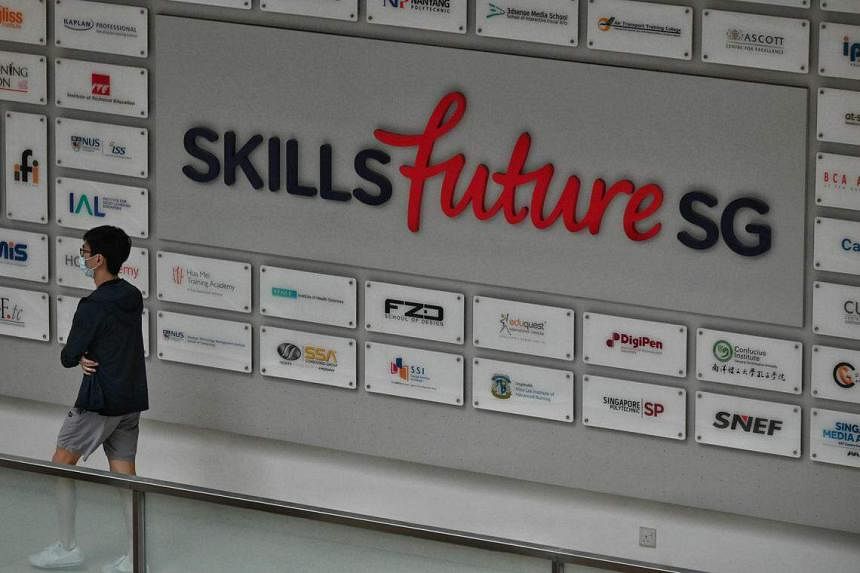
SkillsFuture Singapore had been duped into disbursing the amount as subsidies linked to skills training courses. PHOTO: ST FILE

Shaffiq Alkhatib
Court Correspondent
May 31, 2023
SINGAPORE - A man who helped a syndicate to launder about $40 million – a sum which the prosecution said was the largest fraud involving government funds to date – was sentenced on Wednesday to 13 years and nine months’ jail.
David Lim Wee Hong, 44, committed the offences between Sept 7 and Nov 1, 2017.
He was the last person to admit that he was part of the syndicate that duped SkillsFuture Singapore (SSG) into disbursing the amount as subsidies linked to skills training courses.
In March, he pleaded guilty to 15 charges, mainly for dealing with the benefits of criminal conduct. Another 33 charges were considered during sentencing.
His accomplices – Andy Quek Sze Leng, 41; Sim Soon Lee, 45, and husband-and-wife pair Ng Cheng Kwee, 45, and Lee Lai Leng, 43 – were dealt with in court earlier.
They were each handed jail terms of up to 17 years and nine months.
Deputy Public Prosecutors Ivan Chua, Jordon Li and Tan Zhi Hao had earlier stated in court documents that all five Singaporeans were important members of the criminal syndicate, and that the ruse involved the Course Fee Grant scheme.
As part of the initiative, Singapore business entities that sent employees to attend skills training courses with registered providers could apply for subsidies, and claims were submitted to SSG online.
By using nine dormant entities, about 25,000 purported employees and a network of nominee directors as well as money mules, Lim and other members of the criminal syndicate submitted more than 8,300 fraudulent claims to SSG for training course subsidies. But no training was conducted.
Six of the nine organisations – YK Design Firm, YSK Consultancy Firm, Orient Altitude, Ky And Lin Firm, Glen Point Corp and CKL – were entities that submitted applications for subsidies.
The remaining three – KKL Firm, SK Business Consultancy and Harman Star – were purportedly training providers.
Ng and Lee set up CKL in 2009, and it has been dormant since 2015. Ng incorporated the remaining eight entities in 2014, and they became dormant that year.
At the time of the offences, none of the nine entities carried out businesses or employed any workers.
From January 2017, the couple initiated actions to obtain the course fee grants from SSG. They registered the entities as applicant entities or training providers before using different computers to submit the claims.
The prosecutors said that Lim and Ng had been friends since 2011 and Lim was later introduced to Lee. Between April and October 2017, all five offenders agreed to take part in the ruse to cheat SSG.
Nearly $40 million was disbursed into the bank accounts of all the entities except Glen Point. After that, most of the money was withdrawn via bank transfers or cash cheques.
On Nov 1, 2017, SSG lodged a police report over the claims. That same day, Lim received a call from Ng, asking him to leave $900,000 in the boot of a car.
The DPPs said: “Ng had told (Lim) that the police were probably looking for the car and asked (him) to park the car at a secluded place.”
Lim, who parked the vehicle around Greenleaf View near Holland Road, was arrested two days later.
Of the nearly $40 million disbursed, the authorities managed to recover more than $18 million in cash, bank account balances, insurance proceeds, gold and jewellery.
More than $21 million remains unaccounted for.
So disappointing that there will not be any Plastic Bags Ambassadors to go with the Safe Distancing and Tray Return ambassadors.
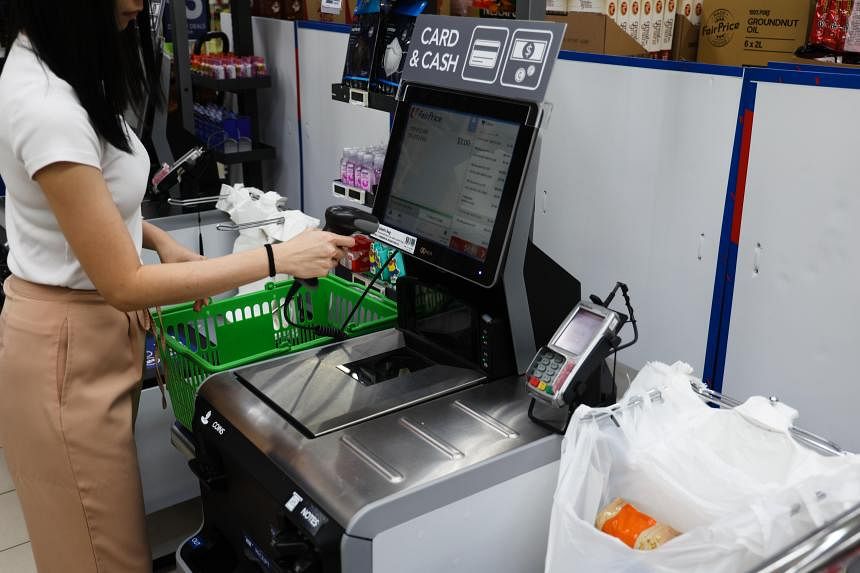
There are no plans to add more staff at self-checkout counters to ensure that customers scan the barcode for plastic bags. PHOTO: LIANHE ZAOBAO
Lynda Hong
Assistant News Editor
June 19, 2023
SINGAPORE – FairPrice customers will be trusted to scan a barcode to pay five cents for every plastic bag they take at self-checkout counters from July 3, when the mandatory plastic bag charge kicks in for major supermarket chains.
There are no plans to add more staff at self-checkout counters to ensure that customers comply, said FairPrice Group chief sustainability officer Chan Tee Seng.
“For now, we want to focus on making it seamless, easy, and not too bureaucratic,” he told reporters after Senior Minister of State for Sustainability and the Environment Amy Khor visited a FairPrice outlet in Bukit Batok West.
“Which is why we have decided to implement an honour system. So we will allow the customers to scan the barcode themselves. If they’ve taken five bags, then they scan it five times. And we believe that by and large, many of our customers will do the right thing.”
FairPrice is now focused on training front-line staff, such as cashiers, to explain the environmental reason for the plastic bag charge.
Details of how the funds collected from the five cent charge will be used for environmental or social causes will be made known in about 18 months, said Mr Chan.
Currently, 11 FairPrice outlets charge 20 cents per transaction when plastic bags are requested at the cashier, regardless of how many bags are used. At 178 convenience shops run by FairPrice, including Cheers and FairPrice Xpress outlets, the charge per transaction is 10 cents.
The mandatory charge of five cents per bag, regardless of the size of the bag, will be applied at all supermarkets as well as convenience stores, where bags can be smaller than those at supermarkets.
FairPrice is also running a pilot at five outlets for customers to donate their excess reusable bags for other customers to use.
In the lead-up to the bag charge in July, environment organisations like Plastic-Lite Singapore and Zero Waste SG have also introduced bag-sharing initiatives at some supermarkets.
Ms Tan Huileng, executive director of Zero Waste SG, said: “The only major problem is when paper bags are donated – they are not water-resistant to hold groceries, especially frozen food.”
Otherwise, they have found that the bag racks do not need much maintenance as people generally keep the bag racks tidy.
Dr Khor reiterated hopes that the bag charge, which is similar to schemes in Hong Kong, Taiwan and Britain, will reduce plastic bag use by 60 to 90 per cent.
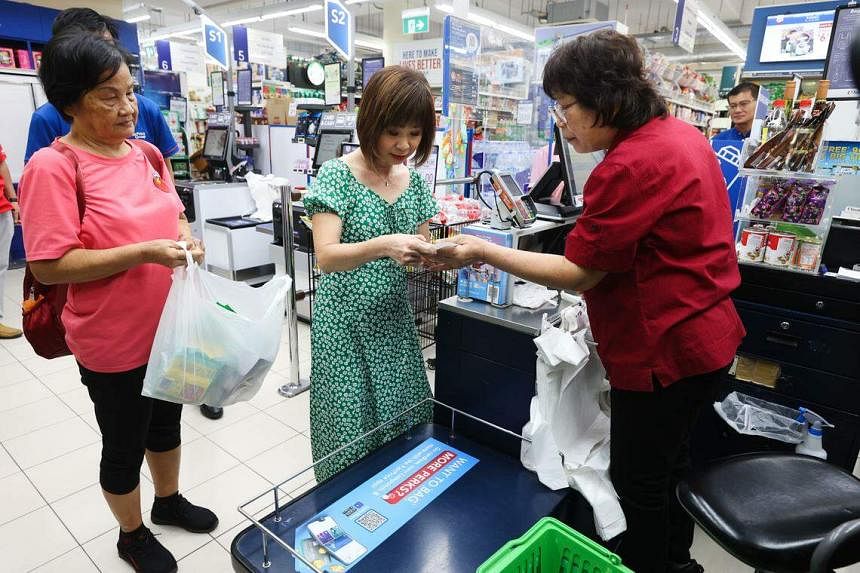
Senior Minister of State for Sustainability and the Environment Amy Khor hopes that the bag charge would reduce plastic bag use by 60 to 90 per cent. PHOTO: LIANHE ZAOBAO
About 400 major supermarkets – or two-thirds of all outlets here – will charge for disposable shopping bags. Under the Resource Sustainability Act, larger supermarket operators with an annual turnover of more than $100 million fall under the mandate. They include FairPrice, Cold Storage, Giant, Sheng Siong and Prime supermarket stores.
Supermarket operator Sheng Siong will be implementing an in-built plastic bag dispenser at self-checkout counters, said a spokesperson. Customers press a button onscreen to receive a plastic bag from the dispenser.
This system has so far been implemented at five Sheng Siong outlets, and will be rolled out to more stores in phases.
The supermarket chain will also train its staff and produce materials to educate customers about the bag charge.
DFI Retail Group – which runs Giant, Cold Storage, CS Fresh, Guardian and 7-Eleven outlets – said it is working closely with its respective partners to ensure a smooth implementation of the bag charge. All staff will be briefed and trained on the necessary procedures.
FairPrice counts on shoppers’ honesty at self-checkout counters when plastic bag charge starts on July 3
1 of 2
There are no plans to add more staff at self-checkout counters to ensure that customers scan the barcode for plastic bags. PHOTO: LIANHE ZAOBAO
Lynda Hong
Assistant News Editor
June 19, 2023
SINGAPORE – FairPrice customers will be trusted to scan a barcode to pay five cents for every plastic bag they take at self-checkout counters from July 3, when the mandatory plastic bag charge kicks in for major supermarket chains.
There are no plans to add more staff at self-checkout counters to ensure that customers comply, said FairPrice Group chief sustainability officer Chan Tee Seng.
“For now, we want to focus on making it seamless, easy, and not too bureaucratic,” he told reporters after Senior Minister of State for Sustainability and the Environment Amy Khor visited a FairPrice outlet in Bukit Batok West.
“Which is why we have decided to implement an honour system. So we will allow the customers to scan the barcode themselves. If they’ve taken five bags, then they scan it five times. And we believe that by and large, many of our customers will do the right thing.”
FairPrice is now focused on training front-line staff, such as cashiers, to explain the environmental reason for the plastic bag charge.
Details of how the funds collected from the five cent charge will be used for environmental or social causes will be made known in about 18 months, said Mr Chan.
Currently, 11 FairPrice outlets charge 20 cents per transaction when plastic bags are requested at the cashier, regardless of how many bags are used. At 178 convenience shops run by FairPrice, including Cheers and FairPrice Xpress outlets, the charge per transaction is 10 cents.
The mandatory charge of five cents per bag, regardless of the size of the bag, will be applied at all supermarkets as well as convenience stores, where bags can be smaller than those at supermarkets.
FairPrice is also running a pilot at five outlets for customers to donate their excess reusable bags for other customers to use.
In the lead-up to the bag charge in July, environment organisations like Plastic-Lite Singapore and Zero Waste SG have also introduced bag-sharing initiatives at some supermarkets.
Ms Tan Huileng, executive director of Zero Waste SG, said: “The only major problem is when paper bags are donated – they are not water-resistant to hold groceries, especially frozen food.”
Otherwise, they have found that the bag racks do not need much maintenance as people generally keep the bag racks tidy.
Dr Khor reiterated hopes that the bag charge, which is similar to schemes in Hong Kong, Taiwan and Britain, will reduce plastic bag use by 60 to 90 per cent.

Senior Minister of State for Sustainability and the Environment Amy Khor hopes that the bag charge would reduce plastic bag use by 60 to 90 per cent. PHOTO: LIANHE ZAOBAO
About 400 major supermarkets – or two-thirds of all outlets here – will charge for disposable shopping bags. Under the Resource Sustainability Act, larger supermarket operators with an annual turnover of more than $100 million fall under the mandate. They include FairPrice, Cold Storage, Giant, Sheng Siong and Prime supermarket stores.
Supermarket operator Sheng Siong will be implementing an in-built plastic bag dispenser at self-checkout counters, said a spokesperson. Customers press a button onscreen to receive a plastic bag from the dispenser.
This system has so far been implemented at five Sheng Siong outlets, and will be rolled out to more stores in phases.
The supermarket chain will also train its staff and produce materials to educate customers about the bag charge.
DFI Retail Group – which runs Giant, Cold Storage, CS Fresh, Guardian and 7-Eleven outlets – said it is working closely with its respective partners to ensure a smooth implementation of the bag charge. All staff will be briefed and trained on the necessary procedures.
.XXR working in Spa.... Their customer ish who hah?Jail for trio linked to ruses to get Covid-19 grants

(From left) Joey Yeo and Danny Ho Wai Hong were each sentenced to two months and a week’s jail. Loo Yi Ming was sentenced to a month’s jail. ST PHOTOS: KELVIN CHNG

Shaffiq Alkhatib
Court Correspondent
DEC 2, 2022
SINGAPORE – Two former spa employees, who falsely claimed that their jobs there had been affected after the Covid-19 pandemic struck, were each sentenced to two months and a week’s jail on Friday.
Joey Yeo, 29, and Danny Ho Wai Hong, 31, each received $500 from a government grant.
Ho worked at Kings Spa, while Yeo worked for the firm when it was known as Spa 9.
The pair pleaded guilty in November to a charge each of cheating and furnishing false information to a public servant.
A third person, Loo Yi Ming, 31, who signed off on fraudulent documents to help the spa obtain another grant, was sentenced to a month’s jail on Friday. He pleaded guilty to a charge of falsification of accounts.
Deidrea Tan Zhong Lin, 31, who was the spa’s director at the time of the offences, was earlier sentenced to seven weeks’ jail over her role in the offences.
The case against her husband Gay Kah Leong, 31, then the spa’s operations manager, is pending.
Deputy Public Prosecutor Tay Jia En said in earlier proceedings that in 2018 or 2019, Yeo came to an agreement with the spa’s management that she would continue as a “phantom employee” after she indicated her wish to stop working.
This meant the spa would continue to make Central Provident Fund (CPF) contributions to her.
A similar arrangement was made between Ho and Gay in August 2018.
Ho, who began working for the spa as a receptionist on July 1, 2018, stopped working there the following month.
But according to court documents, Gay told him that the spa would make CPF contributions to him as a “phantom employee” so that it could continue to hire foreign workers.
From June 2019 to August 2020, Yeo and Ho received monthly CPF contributions from the spa despite not working there, with Yeo receiving at least $7,326 and Ho getting no less than $5,809.
In order to maintain the facade that they were genuine employees, they also signed off on falsified payslips.
In her application for the Temporary Relief Fund, Yeo falsely declared that she had lost her job due to Covid-19 and that her gross monthly income before Jan 23, 2020, was $1,000.
She later admitted that this amount was based on the CPF contributions she was receiving from the spa as a phantom employee. Meanwhile, Ho lied in his application that he lost at least 30 per cent of his income.
He claimed that his gross monthly income before Jan 23, 2020, was $1,500 – which included $1,300 in salary from Kings Spa – and that it had fallen to $800.
DPP Tay had said: “Danny admitted that he had to ‘anyhow put in’ this amount so that it would show that he had lost at least 30 per cent of his personal income.”
Meanwhile, in order to obtain a payout under the Jobs Support Scheme (JSS), which was aimed at providing wage support to employers and helping enterprises retain their local staff, Gay is said to have intentionally submitted fraudulent documents on Aug 10, 2020, to the Inland Revenue Authority of Singapore (Iras) for a self-review.
To prevent and detect abuse of the scheme, Iras implemented a framework for the JSS in June 2020 that identified employers with a higher risk profile.
They were then asked to conduct a self-review by making a declaration and provide supporting documents to substantiate their eligibility.
Loo, who was working as an account manager at another firm, signed off on the falsified documents. Iras reviewed the application but did not disburse the payout to Kings Spa.
Also as part of the self-review, Iras officers contacted Ho and Yeo about their employment statuses. They lied and said they did not illegally receive CPF contributions and that they were employed by the spa at that point in time.
An Iras officer alerted the police on Sept 28, 2020.
Yeo decided to start serving her sentence on Friday.
Loo and Ho were each offered bail of $5,000. Ho will start serving his sentence on Dec 5, while Loo will do so four days later.
SPH Media files police report after potential offences flagged in circulation data probe
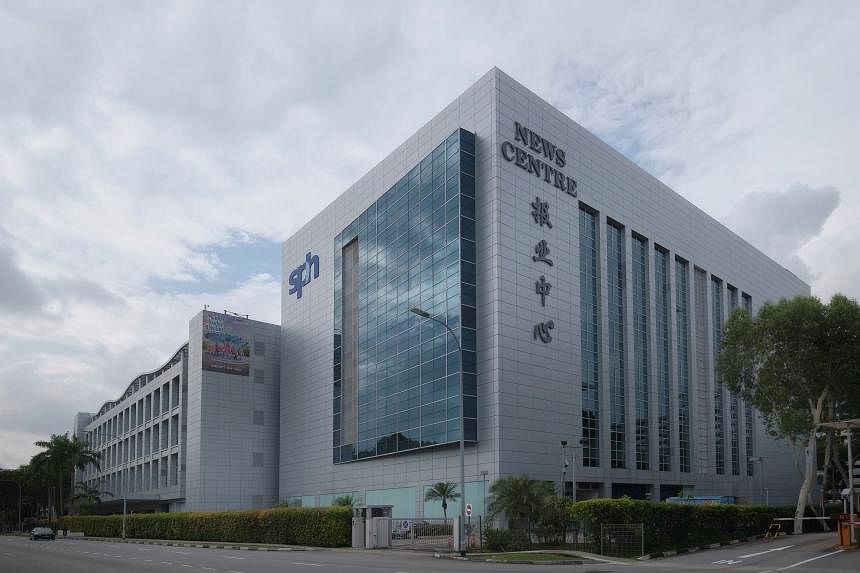
SPH Media said it will cooperate fully with the police following recommendations made in a report by the organisation’s audit and risk committee. PHOTO: ST FILE

Goh Yan Han
Political Correspondent
June 21, 2023
SINGAPORE – SPH Media Group has filed a police report after potential offences were flagged in an investigation into the overstating of circulation numbers.
The media company, which publishes The Straits Times, said in a statement on Wednesday that it will cooperate fully with the police, following recommendations made in a report by the organisation’s audit and risk committee. It had been tasked by SPH Media Holdings’ board in January to look into the inflated numbers.
During an internal briefing for SPH Media publications, Mr Max Loh, who chairs the committee, said the police report was not made against specific individuals or entities but comprised the findings of the investigation.
He added: “We cannot say more than that because it will prejudice police investigations. We’ve laid out what the issues or the findings are. And I think we really have to leave it to the relevant authorities, which, in this case, are the police, to figure out how they’re going to proceed and maybe if at all, they want to proceed.”
When asked about the specific offences that were laid out in the report but redacted, Mr Loh said it was not for the committee to determine the offences. The police have access to the full, unredacted report, he said.
“We’ve drawn a line in the sand, basically, so that we can collectively as an organisation move forward with our own mission and purpose... not being unduly burdened by these legacy things that have bogged us down for the past months,” said the former managing partner of EY Asean and Singapore and a member of SPH Media’s board.
The report, which is available on SPH Media’s website, also determined that there was no evidence found that the journalism and editorial departments were involved in the overstatement of circulation numbers.
The committee had commissioned legal advisers from Allen & Gledhill to assist, and in turn, it appointed accounting firm Deloitte to help with forensic discovery and analysis of relevant data.
SPH Media had said in January that several senior employees had been taken to task or had left the company after inconsistencies were found in reporting circulation data.
The matter came to light after an internal review of processes for the period from September 2020 to March 2022. It was during this time, in December 2021, that SPH Media was created following a restructuring of its then listed parent company Singapore Press Holdings (SPH).
When asked how many people were interviewed for Wednesday’s report, Mr Loh did not give an exact number but confirmed that it included more than 10 people from SPH Media and SPH and that it was “quite thorough and comprehensive”.
It did not, however, include the four staff members who had left the company in January as they had been interviewed for the earlier internal audit, he said.
In the 14-page report presented to the media group’s board on Tuesday, the committee said Allen & Gledhill had found the actions taken against the employees and former employees in January to be “reasonably justified in the circumstances” and in compliance with SPH Media’s policies.
As for employees who were also involved but are still with the company, Allen & Gledhill said they had acted under the instructions of their superiors. They also appeared to have operated under the mistaken belief that the practices directed by the superiors were accepted practices in the company.
The law firm, which reported its findings to the audit and risk committee on June 16, found that SPH had overstated its daily circulation numbers by 82,600 using data from August 2021.
This comprised 49,000 bulk copies via the Newspapers in Education (NIE) Fund that were reported but not distributed; 5,000 from a Y Deal; 15,000 from an X Barter deal; 1,900 school copies, 2,300 airline copies, 9,000 agency copies and 400 from those who had subscribed to all-in-one packages.
The total number accounted for about 10 per cent of reported daily average circulation.
SPH Media did not identify the parties mentioned in the report.
Chief executive Teo Lay Lim had in January sent an e-mail to advertisers saying that circulation data is not used as a basis for SPH Media’s advertising packages. Instead, it uses data on reach and readership from independent third-party research agencies.
SPH Media also said in its statement on Wednesday that there was no material accounting impact to the financial statements of the company for the financial year that ended in August 2022.
The probe found that there were several matters that could potentially constitute offences, citing similar cases in Hong Kong and the United States.
Apart from the police report recommended by Allen & Gledhill, which the committee concurred with, the probe committee also set out various recommendations for the media group.
“SPH Media Group should take the opportunity to evaluate its risk culture, enhance its risk management practices and continually improve its internal controls and processes,” it said.
This includes building a culture where people feel they can speak openly about risks and challenge others, including those in higher positions, who should then positively address any concerns.
Leaders should also set the tone for a quality and risk-oriented culture that balances commercial considerations with risk management.
The committee also noted that SPH Media “has a legacy of operating within individual departments, given the specialised nature of each operation or function”.
It said the firm should perform a comprehensive review of its control environment and practices to balance operation effectiveness and efficiency with its expected standards of conduct and accountability.
Ms Teo said during the briefing on Wednesday that she was as worried as any employee about people who think SPH Media is untrustworthy following this incident.
“The only thing I can say is that if we saw this and we are doing something about it, I hope that those who are reasonable and fair out there will believe that we all want to do what’s right and what’s responsible,” she said.
How the numbers were inflated
The report noted that printing and distributing bulk copies to third parties appeared to be an acceptable practice in the newspaper industry, and was not illegal or prohibited under the Audit Bureau of Circulation, Singapore rules. However, copies cannot be counted if they are returned, unsold or undelivered.There were several instances when this was done, stated the report, which is available on SPH Media’s website.
It added that those involved in overstating circulation numbers and who knew that undelivered copies were included in the reported numbers were from the circulation division.
“There has been no evidence sighted to suggest that the (SPH) board or its senior management (save for [redacted]) were involved in this,” it said.
The report cited examples of how the numbers were overstated, like the printing of ST copies for secondary schools that had requested to change their package deal to include only digital copies.
Another example was the printing copies for school reading corners amid the Covid-19 pandemic when the schools had asked for delivery to be paused. These copies were then sent to a Kaki Bukit warehouse to be disposed of or later distributed.
There were also bulk copies purchased under the NIE Fund to shore up circulation numbers in annual reports to cushion the fall in print circulation numbers and meet key performance indicator targets for the circulation division. Of these, some were disposed of, while there were also digital copies for which no evidence was found on whether they were ever distributed or accessed.
The NIE Fund was originally set up to pay for the distribution of newspaper samples to students, needy families, halfway houses and charities.
How overseas courts have dealt with those who inflate newspaper circulation numbers
There have been cases, in Hong Kong and the United States, where employees of news outlets were taken to task for inflating circulation figures.At the Standard and Sunday Standard in Hong Kong, anti-graft officials arrested six people in 1997 in connection with a scheme to inflate circulation figures for the Hong Kong Standard Newspaper and its sister paper, the Sunday Standard.
Three executives were jailed for terms ranging from four to six months after they were convicted of conspiring with two others, including newspaper tycoon Sally Aw Sian, to defraud companies and people who purchase or might purchase advertising space in the newspapers between 1993 and 1997.
Among other things, they were found to have inflated circulation figures to the Audit Bureau of Circulation (ABC), used a bogus company to purchase excess print newspapers, and disposed of excess newspapers purportedly purchased by the bogus company.
Ms Aw, the adopted daughter of Tiger Balm businessman Aw Boon Haw and executive chairman of Sing Tao Holdings, a publicly listed company that published the newspapers, was not prosecuted.
Hong Kong’s then secretary of justice cited a lack of evidence against her and the public interest as reasons not to prosecute, since doing so might have ruined the newspaper and led to a loss of jobs when unemployment was on the rise.
In 2006, nine former employees and contractors of US news outlets Newsday and Hoy pleaded guilty to participating in a fraudulent scheme between 2000 and 2004 to inflate paid circulation data to induce advertisers to buy advertising space.
Media group Tribune Co, which ran the newspapers, agreed to pay US$15 million in a settlement with the US government.
Newsday and Spanish-language newspaper Hoy Publications admitted that between 2001 and 2004, their employees “systematically inflated” circulation numbers in books and records and lied to ABC, Reuters reported.
The agreement, under which the two newspapers avoided prosecution by the US Attorney’s Office, was reached after they set aside US$90 million to compensate advertisers misled by the false numbers.
Newsday admitted that senior managers told distributors to lie to auditors.
Some of the inflated figures came from Newsday employees posing as customers and buying large quantities of the paper throughout Long Island, New York, prosecutors said.
SPH Media circulation saga: 8 key findings and what went wrong
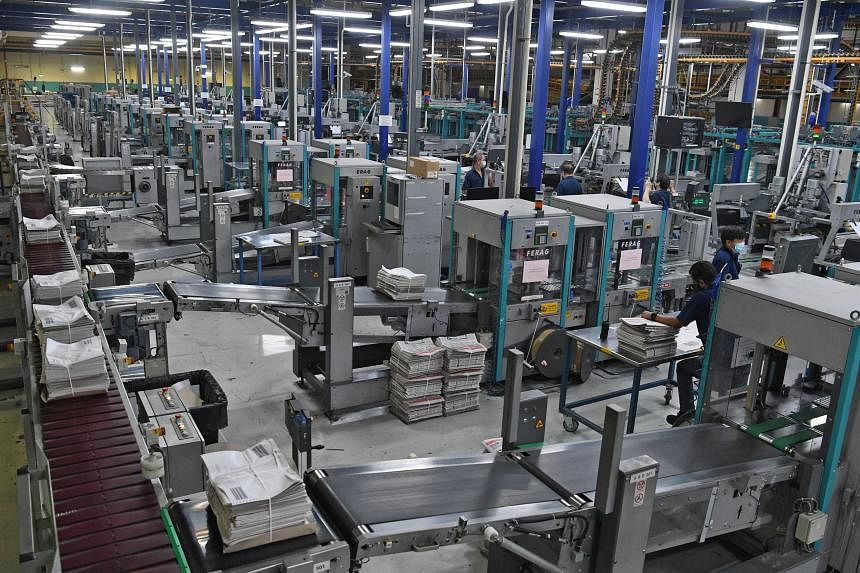
The findings led legal advisers from Allen & Gledhill and the committee to agree that some of the matters could constitute offences. ST PHOTO: DESMOND FOO

Jean Iau
June 21, 2023
SINGAPORE - Singapore Press Holdings (SPH) overstated its daily circulation numbers, among other findings, a report by SPH Media’s audit and risk committee showed on Wednesday.
These findings led legal advisers from Allen & Gledhill and the committee to agree that some of the matters could constitute offences, and that a police report ought to be filed.
The names of individuals and companies involved in the findings were redacted in the report.
Here are the key findings by the legal advisers.
Areas where potential offences could have been committed
1. The Newspapers in Education (NIE) Fund and bulk copies
Bulk copies were understood by those interviewed to mean non-subscription-based news publications sold and distributed at a discounted rate or for free in large numbers.These copies would be bought or sponsored by corporate customers, or paid for out of the NIE Fund at a heavily discounted rate.
While the details of who and when the fund was set up could not be confirmed, it dated back to as early as 2000.
It was set up to pay for the distribution of bulk copies to students, needy families, halfway houses and charities to increase SPH publications’ readership.
This practice was common knowledge. Management reports by the circulation division that were presented to the chief executive and board referred to “bulk” and “booster” copies. Booster copies were understood to be used to increase circulation numbers.
Revenue into the fund came from packages sold under an education deal, a third-party contract, the sale of PSLE Oral Guidebooks, journalism workshops conducted for schools, editorial write-ups and roadshows or promotional events for smaller advertisers.
Some clients were not aware that the money they paid to SPH would be used to buy bulk copies.
The bulk copies shored up circulation numbers in SPH’s annual reports, cushioned the fall in print circulation numbers, and allowed the circulation division to meet key performance indicator targets.
These targets relating to circulation numbers were discussed with senior management and approved as part of the then listed company’s annual budget.
The number of NIE bulk copies would usually be the highest in August as these numbers would be used in SPH’s annual report.
In recent years, more digital NIE bulk copies, which cost less than print copies, were added to cushion the fall in print circulation and maintain circulation numbers.
The fund was closed in May 2022 following the discovery of the overstatement of numbers in March that year.
The board did not appear to be aware of the operational aspects of the fund, and only the circulation division seemed to know about the source of money paid into the fund.
What was wrong: In August 2021 alone, bulk copies through the NIE Fund which were reported but not distributed accounted for 49,000, or more than half, of the overstated average daily circulation number.
Printing and distributing bulk copies to third parties is not illegal or prohibited under the rules of the Audit Bureau of Circulations (ABC) Singapore.
However, copies cannot be counted if they are returned, unsold or undelivered.
This means that the circulation numbers in SPH’s annual reports for FY2020 and 2021, and the biannual and annual submissions to the Infocomm Media Development Authority (IMDA) and SingStat were inflated.
Those who knew about the overstatement of circulation numbers and that the bulk copies that were not delivered but yet reported were from the circulation division.
No evidence suggests that the board or senior management, aside from one individual whose name was redacted, were involved.
There are also grounds to suggest improper accounting of the NIE Fund as financial reporting standards require that an entity recognise revenue when it satisfies its obligations under a contract with a customer.
However, some money earned from customers were booked into the NIE Fund as liabilities instead of revenue.
Likewise, the NIE bulk copies which were not sold or distributed in a transaction with a third party should not have been recognised as circulation revenue.
2. X Barter Deal
Between 2013 and 2022, SPH had a barter, or exchange, agreement with a news company identified only as X.The arrangement involved X providing its e-paper digital subscriptions to SPH in exchange for 10,000 Straits Times (ST) and 5,000 Business Times (BT) digital subscriptions.
Only seven digital codes for ST and BT were accessed during an 18-month period ended July 29, 2022.
The amount paid to X by SPH and vice versa offset each other, and no real cash changed hands.
The deal aimed to expand SPH news publications’ outreach and distribute them in other jurisdictions at zero or low real costs. The deal also sought to promote the publications locally by building subscriptions with complimentary access to foreign news publications.
While the board was aware of the existence of barter deals, there is no evidence that they were told of the operational details of these deals.
What was wrong: While barter deals between media organisations are legitimate and long-established practices and not, in and of themselves, improper, the barter deal could have evolved into a questionable arrangement if entered into for the sole purpose of inflating circulation numbers and revenue without a genuine intention to execute the arrangement.
Red flags in the X Barter Deal include unexplained variances in the terms and conditions of the deal, and the absence of evidence showing the distribution of the digital activation codes.
If the deal was not a genuine arrangement, the corresponding revenue and expenses should not have been recognised, and the circulation numbers should not have been counted.
Other findings from the investigation
3. School copies
SPH publications were supplied to schools under two arrangements.Under the first deal, SPH supplied secondary schools with a print and digital package of both the IN Paper and ST.
For FY2020, an employee directed the circulation division to stop printing and delivering ST print copies to schools at the schools’ request, but to continue reporting these copies as part of ST’s print circulation numbers.
No ST print copies were in fact printed or delivered under this deal from FY2020 onwards.
The following year, the package was revised to exclude the ST print copy, leading to a reduction of 1,900 daily circulation numbers for ST print copies. However, the circulation division was directed to use the NIE Fund to print more print copies to plug the gap in circulation targets for that financial year.
The circulation division continued to print copies of the IN Paper, when schools wanted only the digital copy. Printed copies of IN Paper were delivered to an SPH warehouse in Kaki Bukit and disposed of.
The second arrangement involved reading-corner print and digital copies of SPH news publications placed in tertiary schools.
During the Covid-19 pandemic, when schools requested to pause the delivery of print copies for their reading corners owing to school closures, these copies were still printed, sent to the Kaki Bukit warehouse, and eventually disposed of or stored and redistributed later.
However, these copies were included in SPH’s reported circulation numbers.
The number of copies that were sent to Kaki Bukit during the school closures and disposed of is not known.
The report said there was no available evidence that the SPH’s board or its senior management, aside from some redacted names, knew about the issues surrounding the school copies.
4. Avatar copies
“Avatar” was understood among interviewees who were aware of the term to mean “throw away”.It referred to the NIE bulk copies and the reading-corner copies which were not distributed during the school closures but instead disposed of.
The bulk copies were stored in the print centre, and on the instructions of the circulation division, shredded and sold to a third-party waste collector.
They were also delivered to the client at a later date, or delivered to halfway houses and charities in case of audit checks.
The reading-corner copies were printed during school closures and delivered to Kaki Bukit, and some were eventually disposed of.
It could not be determined when the practice of disposing of print copies started, how many print copies were not delivered and instead disposed of, or how many copies were delivered to clients, halfway houses or charities.
Only employees in the circulation division knew about “Avatar”. There is no evidence to suggest that the board was aware of the practice of disposing print copies or the term “Avatar”.
5. Y deal
From 2013 to March 2022, an entity identified only as Y paid SPH royalty fees monthly to print and distribute 5,000 daily copies of ST.These were reported as part of SPH’s circulation numbers even after the arrangement ended in February 2021.
As instructed by an unnamed individual, Y was charged a nominal sum from November 2021 onwards to allow the 5,000 copies to continue being reported in SPH’s circulation numbers.
6. Airline copies
From October 2018, an unnamed airline had an arrangement with SPH where it paid SPH each month for unlimited digital downloads of various SPH media and news titles such as ST, BT, Lianhe Wanbao, Shin Min Daily New, Lianhe Zaobao, Berita Harian and Tamil Murasu.About 2,500 daily digital copies were reported in SPH’s circulation numbers, although only about 110 to 220 copies were downloaded daily.
7. Agency subscriptions
SPH had an agreement with two agencies from Oct 1, 2019 to Sept 30, 2022, where it supplied about 4,500 digital coupon passes to each agency for a three-year access to ST online on the smartphone app and Web browser at a certain price.Due to system constraints, two subscription codes were created per pass, with one subscription recorded at full price and the other at a 100 per cent discount, resulting in a double-counting of digital copies reported in the circulation numbers.
8. All-in-one subscription packages
These packages were introduced in 2011, and provided subscribers with print and digital copies. Around 2016, some subscribers asked that the print copies not be delivered, but still paid the same amount for the package.SPH continued to print these copies, which were likely disposed of, and reported them in its circulation numbers.
This is what happens when there is lax enforcement.
Similar threads
- Replies
- 1
- Views
- 424
- Replies
- 2
- Views
- 541
- Replies
- 8
- Views
- 680
- Replies
- 8
- Views
- 669
- Replies
- 1
- Views
- 208
